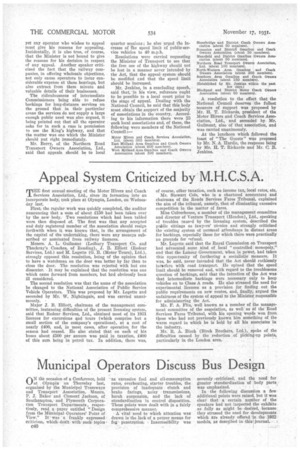Appeal System Criticized by M.H C.S
Page 62

If you've noticed an error in this article please click here to report it so we can fix it.
TI-111 first annual meeting of the Motor Hirers and Coach Services Association, Ltd., since its formation into an incorporate body, took place at Olympia, London, on Wednesday last.
First, the regular work was quickly completed, the auditor announcing that a sum of about £150 had been taken over by the new body. Two resolutions which had been tabled were then disposed of. The first was that any accepted and duly registered member of the association should resign forthwith when it was known that,, in the arrangement of the capital of the undertaking, there were any moneys subscribed or nominated from railway finances.
Messrs. A. L. Guilmant (Ledbury Transport Co. and Thackray's Coaches, of Reading), J. B. Elliott (Recker Services, Ltd.) and M. Logette (G. B. (Motor Tours), Ltd.), strongly opposed this resolution, being of the opinion that to have a watchman on the door was better by far than to close the door. The resolution was rejected with but one dissenter. It may be explained that the resolution was one which came forward from members, but had obviously been ill considered.
The second resolution was that the name of the association be changed to the National Association of Public Service Vehicle Operators. This was proposed by Mr. Logette and seconded by Mr. W. Nightingale, and was carried unanimously.
Major S. B. Elliott, chairman of the management committhe, instancing difficulties of the present licensing system, said that Redcar Services, Ltd., obtained most of its 1931 iicenees for excursions and tours (which comprise but a small section of the company's operations), at a cost of nearly £400, and, in most cases, after operation for the season had ceased. He also stated that on each of his buses about £500 per annum was paid in taxation, £400 of this sum being in petrol tax. In addition, there was, of course, other taxation such as income tax, local rates, etc. Mr. Stewart Cole, who is a chartered acecluntant and chairman of the Roads Services Fares Tribunal, explained the aim of the tribunal, namely, that of eliminating excessive competition in the matter of fares. Miss Culverhouse, a member of the managemerlt committee and director of Venture Transport (Hendon), Li1d., speaking
of troubles eaused by the licensing system, described the•the existing system of nersanal attendance in distant areas public sittings as lawyers' picnics and strongly criticized for backings, especially those for which the-re were practically no grounds for refusal.
Mr. Logette said that the Royal Commission on Transport had advocated some kind of local " controlled monopoly, and that the Labour Government, when in power, had taken this opportunity of furthering a socialistic measure. It was, he said, never intended that the Act should ruthlessly inIarfere with road transport. Ile opined that the speed limit should be removed and, with regard to the troublesome question of backings, said that the intention of the Act was that intermediate backings were necessary orly to keep vehicles on to Class A roads. He also stressed she need for experimental licences as a provision for finding out the public requirements on new routes, and, finally argued the unfairness of the system of appeal to the Ministe responsible for administering the Act.
Mr. F. A. Flin, well known as a member of the management committee of the association, as well as f the Road Services Fares Tribunal, With his opening wor s won from those who had not previously knOwn him" some lingof the warm regard in which he is held by all his associates in
the industry. .
Mr. R. A. Birch (Birch Brothers, Ltd.), ske of the difficulties caused by the reduction of picking-up points, particularly in the London area. ,












































































































